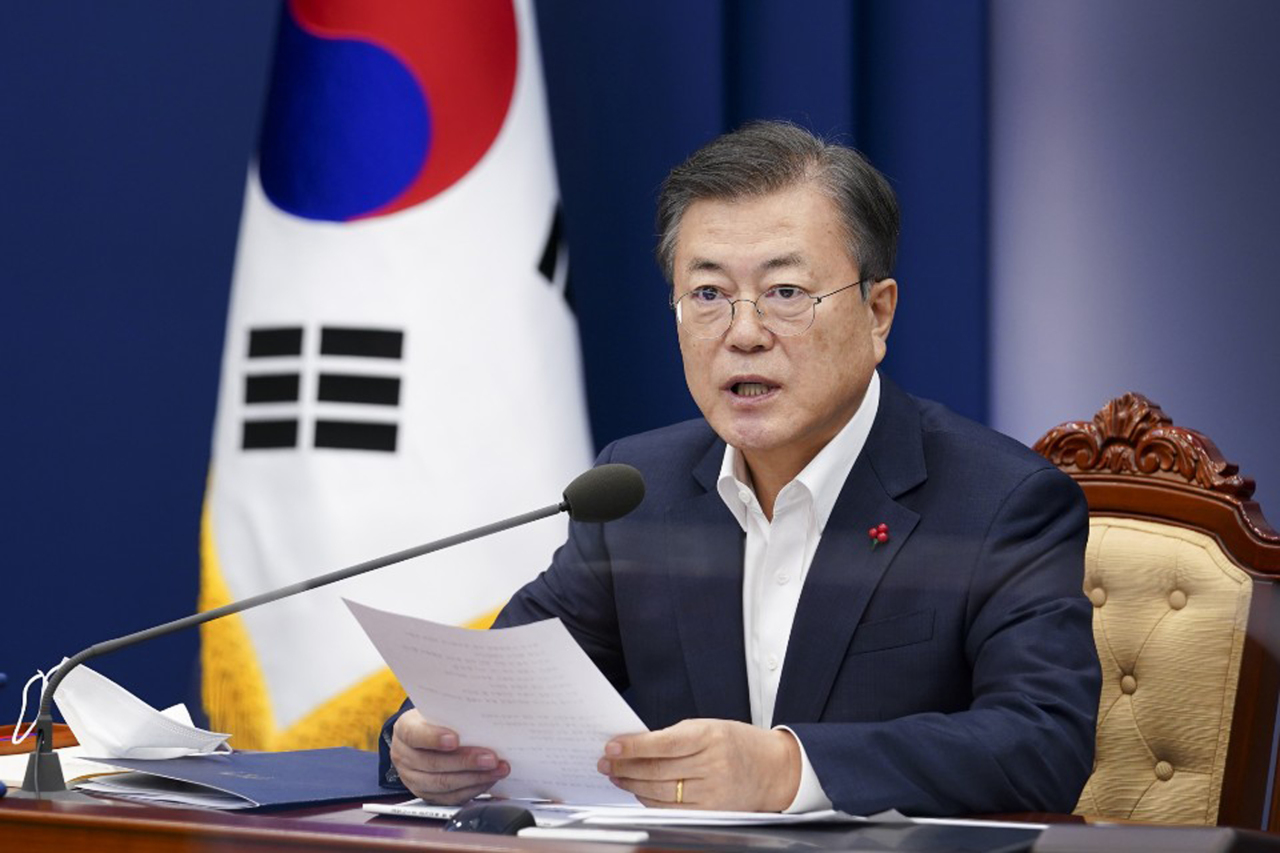 |
President Moon Jae-in speaks at a meeting tied to briefings from health authorities held at Cheong Wa Dae on Monday. (Yonhap) |
President Moon Jae-in on Monday called for his administration to seek institutionalized measures that could financially aid small businesses and the self-employed hit by the COVID-19 pandemic.
“I hope the government and the ruling Democratic Party will jointly discuss measures to institutionalize compensation for the losses of small business owners and the self-employed within a range that the state budget can afford,” he said to pool reporters in a meeting tied to briefings from local health authorities.
Moon’s announcement comes as potential presidential candidates and political heavyweights have intensified their criticism of the Financial Ministry over its cautious stance on budget decisions in an apparent move to win voters’ hearts ahead of the Seoul and Busan mayoral elections in April.
Allocating additional taxpayers’ money for emergency handouts and economic stimulus coupled with the issue of legislation of the financial aid program for the self-employed were key issues for the criticisms so far.
“It is regretful to see (the Finance Ministry) so adamant against financial support for spending and households in a bid to protect fiscal stability, while focusing only on dangers of growing national debt,” Gyeonggi Province Gov. Lee Jae-myung wrote on his Facebook page Saturday.
Lee also implied the ministry has been taking steps backward as the world has been implementing expansionary fiscal policies. The Gyeonggi Province governor and the ruling Democratic Party of Korea lawmaker has been tipped as a strong prospective presidential candidate, topping the popularity poll by local pollster Hangil Research & Consulting in October, involving roughly 1,000 people.
Taking a similar stance to Lee, Prime Minister Chung Sye-kyun called the Finance Ministry a “force against reform,” in an interview with a local media outlet on Wednesday, for hinting at disagreement toward legalizing the self-employed financial support program. Vice Finance Minister Kim Yong-beom has indirectly dismissed the possibility, saying in a press briefing held the same day that “it is difficult to find a country that has legalized such a program.”
Chairman of the Democratic Party Lee Nak-yeon, despite being a member of the same party as Lee Jae-myung and Chung, voiced support for the Finance Ministry in an interview with another outlet on Saturday.
Pressuring the ministry won’t bring about a resolution, he said, though he agreed on the need for an expansionary fiscal move. The party leader also questioned whether it was necessary to voice such disagreement to the press, when it could be discussed between the government and the parties.
Former four-term conservative lawmaker Yoo Seong-min took a tougher stance against Lee Jae-myung and Chung in the matter.
“Gov. Lee Jae-myung’s stance is always about handing out money,” he said in his Facebook page Sunday.
Yoo said that despite his seemingly populist policy suggestions, the Gyeonggi governor was always unclear about how much budget was needed in such policies.
The dispute over the Finance Ministry’s policies comes after the National Assembly last year passed a total of four extra budgets worth a combined 66 trillion won ($57 billion) in a single fiscal year, to cope with economic losses stemming from the COVID-19 pandemic. This prompted worries about the nation’s fiscal health and the growing national debt, which soared to a record-high of nearly 100 trillion won as of November last year.
The latest extra budget of 7.8 trillion won, approved in late September, pushed up total government debt to 43.9 percent of gross domestic product as of end-2020 -- up a record 5.8 percentage points on-year. The figure gained 2 percentage points in 2009, in the aftermath of the 2008 global financial crisis and experts project the figure to jump to some 47 percent by the end of 2021.
Korea’s government debt-to-GDP ratio might seem low compared with the US’ roughly 127 percent as of third-quarter of 2020 and Japan’s, which has surged over 200 percent, but experts highlight the difference in the countries’ economic structures.
Despite such concerns, some lawmakers have been calling for the Finance Ministry to be more lenient on spending taxpayers’ money.
Though elections have often put the Finance Ministry between a rock and a hard place -- as the role of the nation’s budget officer -- the economic fallouts due to the coronavirus pandemic and concerns of the nation’s growing national debt have apparently pushed the ministry into a stronger limelight.
By Jung Min-kyung (
mkjung@heraldcorp.com)








![[Today’s K-pop] Blackpink’s Jennie, Lisa invited to Coachella as solo acts](http://res.heraldm.com/phpwas/restmb_idxmake.php?idx=644&simg=/content/image/2024/11/21/20241121050099_0.jpg)